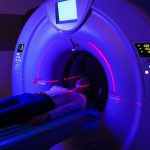Radiotherapy can prevent breast cancer from returning for up to 10 years, study finds
A new long-term study has found that radiotherapy after surgery can help prevent breast cancer from coming back in the same area for up...
Promising cancer detection blood test may not be so effective
A new blood test called Galleri, which claims to detect over 50 types of cancer, is under scrutiny.
The NHS has been testing Galleri on...
Breast cancer drug shows potential in treating brain tumors
A drug that has proven effective in treating breast cancer is now showing promise in addressing breast cancer that has spread to the brain,...
New drug combo for treating brain metastases in breast cancer
A study from the University of Michigan Health Rogel Cancer Center has found that combining a fatty acid inhibitor with chemotherapy could enhance treatment...
Hormone therapy for breast cancer may lower dementia risk
A recent study suggests that hormone therapy for treating breast cancer could lower the risk of developing Alzheimer’s disease and similar dementias.
This research, one...
New blood test can predict breast cancer return years in advance
Scientists have created a new, highly sensitive blood test that can predict the return of breast cancer months or even years before it happens.
This...
Scientists find higher risk of second cancers in breast cancer survivors
Survivors of breast cancer, who represent the largest group of cancer survivors in the UK, are facing significantly higher risks of developing second cancers.
This...
Radiation side effects in breast cancer treatment: What you need to know
Breast cancer, one of the most common cancers among women worldwide, often involves radiation therapy as a key part of treatment. Radiation therapy aims...
Pre-mastectomy radiation reduces wait for breast reconstruction surgery
In an innovative study from The University of Texas MD Anderson Cancer Center, researchers have introduced a game-changing approach to breast cancer treatment that...
How fast can breast cancer spread?
Breast cancer, a journey no one chooses to embark on, remains one of the most common and formidable foes in the world of health.
Understanding...










